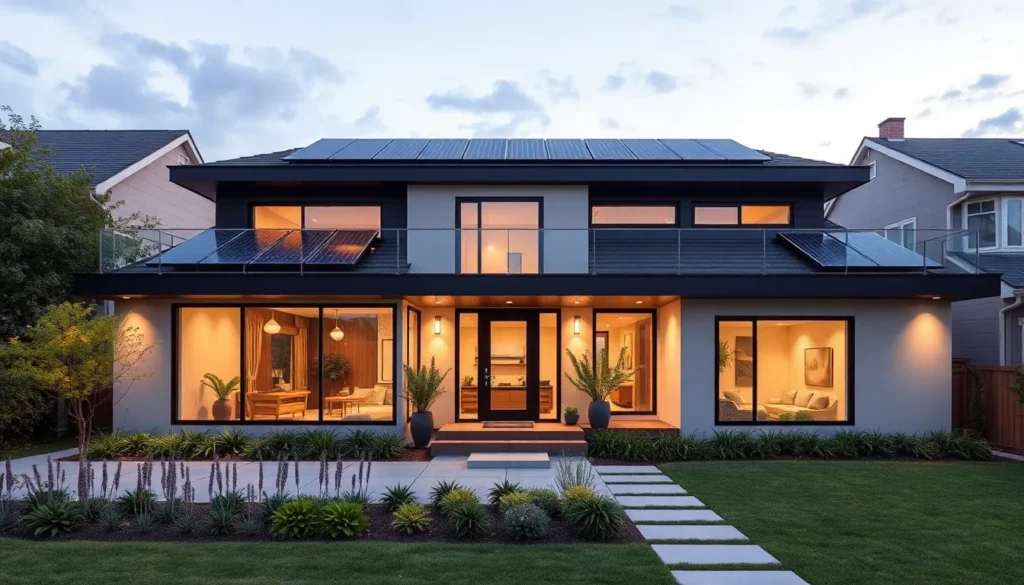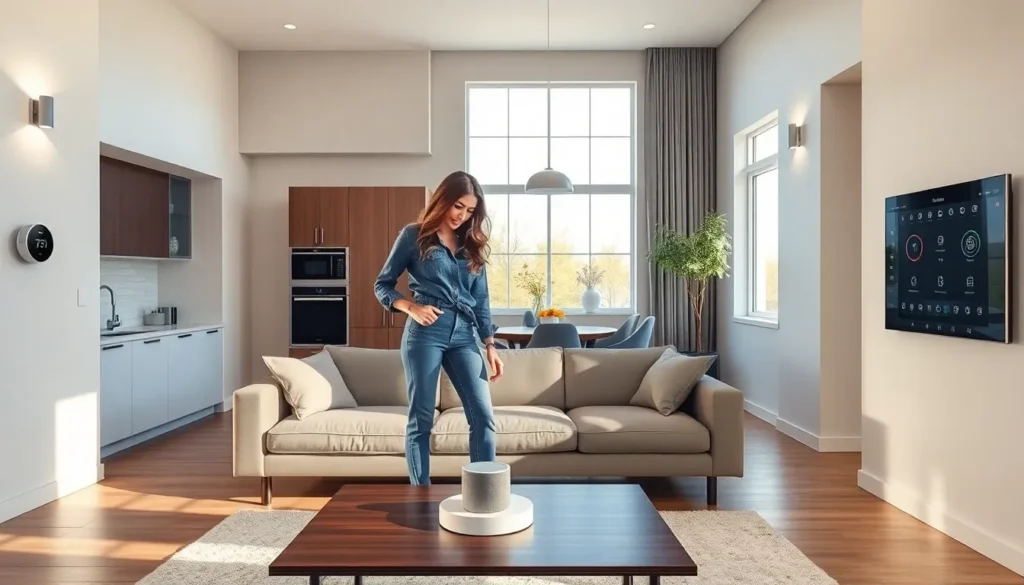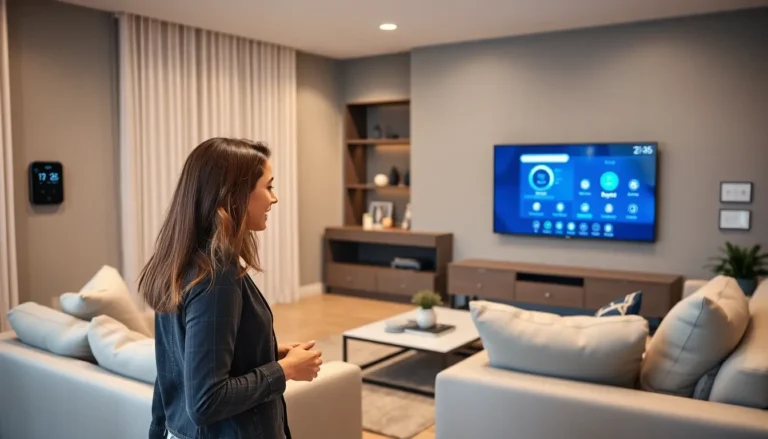Imagine walking into your home and having it greet you like a long-lost friend. Smart new homes are redefining the way people live, blending comfort with cutting-edge technology. From voice-activated assistants to energy-efficient appliances, these homes don’t just make life easier; they make it downright fun.
Table of Contents
ToggleOverview of Smart New Homes
Smart new homes integrate technology to enhance efficiency and comfort. These residences often feature systems that automate tasks, providing convenience and security. Common elements include smart thermostats, which adjust heating and cooling based on occupancy. Homeowners find that these systems promote energy savings while maintaining a comfortable environment.
Voice-controlled devices represent another vital aspect of smart homes. These devices enable hands-free operation of various functions, such as lighting and entertainment systems. Integration with smartphones allows residents to monitor and control their homes remotely. Alerts about security breaches or maintenance issues can also be sent directly to users.
The health benefits associated with smart new homes should not be overlooked. Many systems track air quality and manage humidity levels, contributing to a healthier living space. Smart appliances often optimize energy use, reducing environmental impact while lowering utility bills.
Safety features enhance peace of mind. Smart locks enable secure, keyless entry, and video doorbells provide real-time surveillance. These systems can connect to emergency services, ensuring swift responses in critical situations.
Smart new homes represent a shift towards modern living. Embracing technology not only streamlines daily tasks but also transforms how individuals interact with their homes. The amalgamation of comfort, security, and efficiency creates an appealing lifestyle for many modern homeowners.
Key Features of Smart New Homes

Smart new homes feature multiple advanced technologies that enhance comfort and efficiency. Several key elements define these homes.
Home Automation Systems
Home automation systems simplify everyday tasks. These systems control lighting, heating, and appliances remotely. Smart hubs connect devices for seamless integration, allowing users to manage everything from a smartphone or tablet. Voice-activated assistants serve as central controls, making it easy to adjust settings without manual effort. Customization options enhance user experience, enabling personalized routines that adapt to individual lifestyles.
Energy Efficiency
Energy efficiency plays a crucial role in smart new homes. Smart thermostats optimize heating and cooling based on occupancy patterns, reducing energy waste. Automated shades adjust throughout the day, maximizing natural light for comfort while minimizing reliance on artificial lighting. Energy-efficient appliances, such as smart refrigerators and washers, consume less power and provide usage insights. These features contribute to sustainable living while lowering utility bills significantly.
Security Enhancements
Security enhancements ensure peace of mind for homeowners. Smart locks offer keyless entry, allowing users to grant access remotely. Indoor and outdoor cameras provide real-time monitoring of properties, increasing surveillance capabilities. Motion sensors alert homeowners to unusual activity, enabling quick responses to potential threats. Integration with emergency services enhances security further, ensuring safety in critical situations.
Benefits of Smart New Homes
Smart new homes deliver significant benefits through advanced technology integration. Convenience, comfort, and cost savings stand out as the primary advantages homeowners experience.
Convenience and Comfort
Smart new homes enhance daily life with automated systems. Homeowners control lighting, heating, and appliances remotely through smartphones. Voice-activated assistants make hands-free operation easy. Personalized settings for temperature and ambiance create a tailored living experience. Remote access offers the ability to monitor home security and systems from anywhere. Flexibility in managing household tasks increases overall convenience.
Cost Savings
Smart new homes provide substantial cost savings. Energy-efficient appliances significantly lower utility bills. Smart thermostats adjust heating and cooling in real-time, optimizing energy use. Automated shades reduce energy consumption by blocking unwanted sunlight. In addition, many smart devices feature energy monitoring, allowing homeowners to track usage and make informed decisions. With reduced energy waste, financial benefits accumulate over time.
Challenges of Smart New Homes
Smart new homes present several challenges for homeowners and builders. Understanding these challenges helps navigate the transition to smart living.
Initial Investment
Initial investment in smart new homes often stands as a significant barrier. Costs for advanced technologies like smart thermostats and security systems can range from $1,000 to $10,000, depending on the complexity and number of devices installed. Many homeowners hesitate to spend that much upfront, even when long-term savings are evident. Budgeting for these technologies requires careful consideration alongside traditional construction expenses. Financing options may exist, yet they often involve higher interest rates, making the overall cost daunting. Homebuyers must evaluate if the advantages outweigh the initial investment.
Technology Integration
Technology integration poses another challenge for smart new homes. The variety of devices and platforms means compatibility may vary significantly, complicating installation and usability. Different manufacturers might produce devices that don’t seamlessly connect, leading to frustrations for homeowners. Some advanced systems require professional installation, adding to costs and timeframes, while DIY setups depend on the homeowner’s tech skills. Cybersecurity risks also arise with interconnected devices, as vulnerabilities can expose personal data. Ensuring secure and efficient integration demands careful planning and expertise, which can further complicate the smart home journey.
Smart new homes are transforming the way people live by seamlessly blending technology with daily routines. With features designed for convenience and energy efficiency, these homes offer a lifestyle that prioritizes comfort and security. Homeowners benefit from enhanced control over their environment while enjoying potential cost savings on utilities.
Despite the initial investment and integration challenges, the advantages of smart living are compelling. As technology continues to evolve, the appeal of smart new homes will likely grow, making them a desirable choice for modern homeowners seeking to enhance their living experience. Embracing this shift not only promises a more connected home but also a more efficient and enjoyable way of life.





